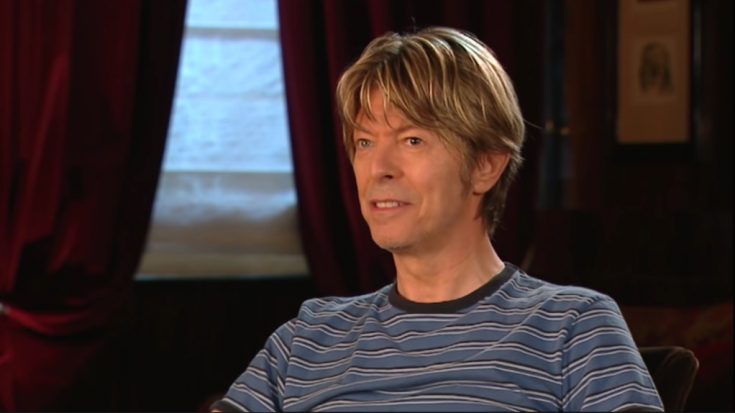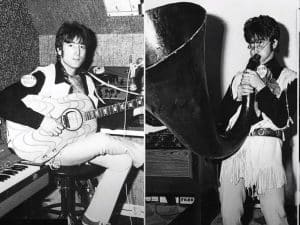David Bowie Once Had Prophecy For Kanye West – And It Came True

via 60 Minutes Australia / YouTube
Numerous music enthusiasts and experts are drawn to a plethora of conspiracy theories within the realm of music. These intriguing narratives intricately weave actual events, uncanny coincidences, and age-old anecdotes, giving rise to compelling notions that prompt us to reconsider our perceptions of renowned musicians.
One particularly notable theory establishes a connection between David Bowie and Kanye West—two iconic artists who have left an indelible mark on different eras of the music industry.
In 2013, when West anointed himself as Yeezus, he might not have been off the mark, as per fervent music conspiracy theorists.
According to this speculative narrative, the rap icon’s trajectory toward becoming one of music’s most groundbreaking and contentious figures wasn’t a recent development; rather, it was seemingly predetermined as far back as 1972—the year the late Bowie released his seminal record The Rise and Fall of Ziggy Stardust and the Spiders from Mars.
Ziggy Stardust and ‘K. West’
In that fateful year, the iconic David Bowie introduced one of the most celebrated alter-egos in rock, Ziggy Stardust, in his fifth studio release the groundbreaking rock-opera album, “The Rise and Fall of Ziggy Stardust and the Spiders from Mars.”
This rock-opera album launched the alien Bowie with the flaming red hair into everybody’s consciousness. As surmised by an intriguing 2007 Blogspot site, which claimed to be the “official blog for the Kanye West, David Bowie conspiracy”, this album presents a compelling argument unconventionally linking Bowie and West.
The narrative unfolds with Bowie’s album cover capturing him in an animated pose on a dimly lit London street, surrounded by cardboard boxes and damp concrete.
Notably, amidst this urban backdrop, a singular illuminated shop sign hangs just above Bowie’s head, boldly displaying the letters “K. West”. The question of coincidence arises—could this seemingly incidental detail be the obscure starting point for the peculiar interconnection between Bowie and West?
The prophesied ‘Starman’
The theory goes deeper than a mere mention of names, delving into the meaning of the album’s opening track, “Five Years”. The lyrics vividly portray a bleak scenario, predicting the world’s impending demise within a five-year span—unless, of course, a mysterious figure called the “Starman” descends to Earth, ready to save humanity from its self-destructive course.
Fast forward to June 8th, 1977, five years and two days later—the exact birthdate of Kanye West. It’s almost as if Bowie’s foretold “Starman” had manifested in the form of the future rap star.
In a 1974 Rolling Stone interview, Bowie eerily described how his alter ego would exit the stage of existence. “As soon as Ziggy dies onstage, the infinites take his elements and make themselves visible,” he articulated with uncanny foresight.
When the rock icon departed on January 10th, 2016, Kanye promptly emerged as one of the first artists to honor him. Just an hour after the official announcement of Bowie’s passing on Facebook, West utilized Twitter to convey his sentiments, stating, “David Bowie was one of my most crucial inspirations—so fearless, so creative; he bestowed upon us a lifetime of magic.”
More and more coincidences
After Bowie’s death and West’s comments, the theory gained traction when a Reddit user introduced some noteworthy updates. One key observation highlighted in this iteration is the assertion that David Bowie’s final album, Blackstar, serves as a not-so-subtle confirmation that Kanye West is his chosen successor.
The rapper, being literally a black star, aligns with the album’s thematic elements. The opening track, “Blackstar”, features lyrics that, in retrospect, appear eerily revealing: “Something happened on the day he died / Spirit rose a meter and stepped aside / Somebody else took his place, and bravely cried / ‘I’m a blackstar, I’m a blackstar!’”
To add another layer to the narrative, the third track on Bowie’s Blackstar, recorded during his clandestine 18-month battle with cancer, is titled “Lazarus”, a direct reference to the Biblical character who falls ill and dies but is resurrected by Jesus through the power of prayer.
Notably, the third track on West’s 2013 Yeezus album is titled “I Am A God”, a choice that, when coupled with the rapper’s past imagery like posing with a crown of thorns on the cover of Rolling Stone in 2006, fuels the theory further.
https://twitter.com/YeMoments/status/1540004793984454662
The Rolling Stone’s turning point
Naturally, skeptics are swift to highlight the seemingly coincidental nature of these connections. For instance, the ‘K. West’ sign on Bowie’s album cover is pointed out to be a reference to an actual tailor in London during that period. Nevertheless, for adherents of this theory, these details are perceived as mere footnotes within a broader, almost mystical narrative.
Enthusiasts on platforms like Reddit frequently express their admiration for both artists, emphasizing parallels in their continuous evolution, distinct musical ‘eras,’ and proclivity for controversy. One comment encapsulates this sentiment:
“I’ve always considered Kanye to be this era’s David Bowie. Constant changes in sound, distinct ‘eras,’ and fashion, often controversial, and have been some of the biggest boundary pushers in the mainstream. If only they were able to collaborate, it’d put the Paul McCartney collab to shame.”
Some fans mourn the potential for a missed opportunity for a collaboration that could have surpassed their individual bodies of work. Others ponder the pressures and expectations that Kanye might bear in living up to such a prophetic legacy. Regardless of whether these connections between Bowie and West are merely coincidences or possess deeper significance, the narrative brings together two profoundly influential artists.











